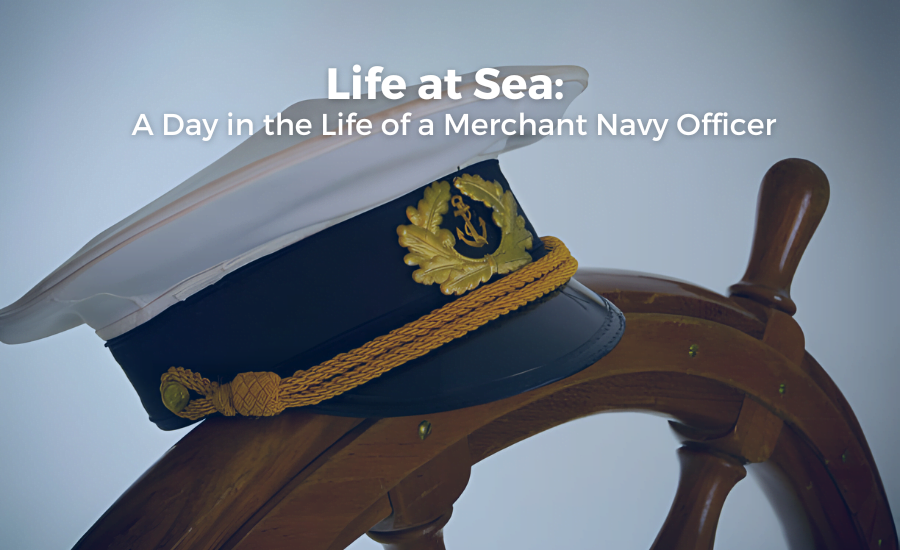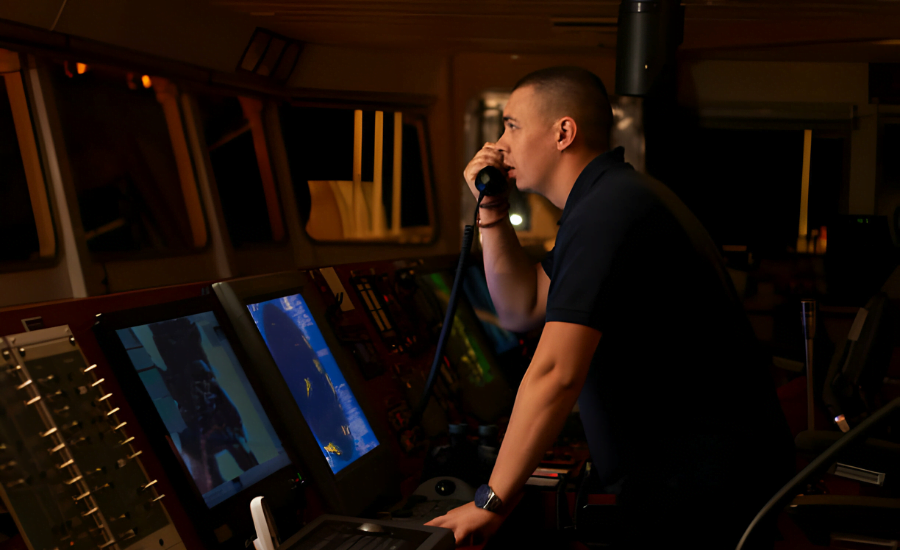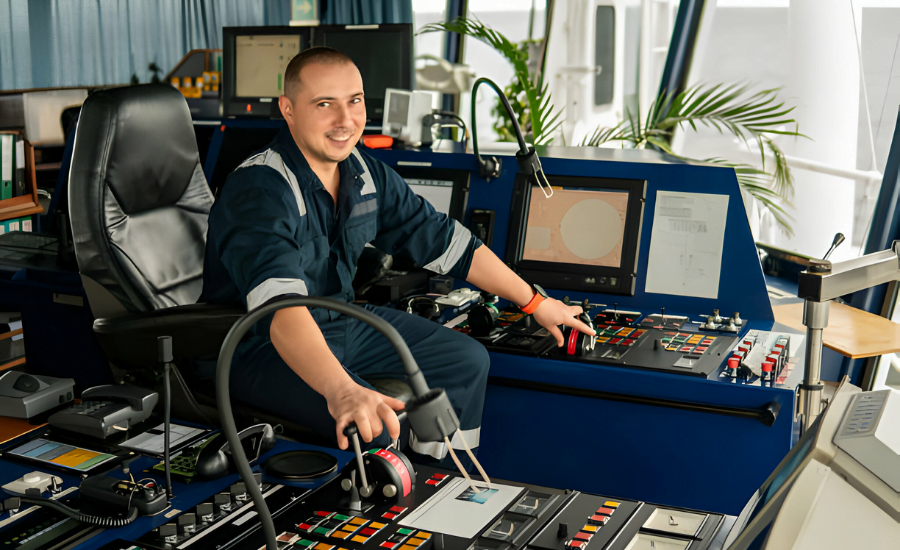
Ever wonder what it’s like to live and work at sea? As a Merchant Navy officer, your office is a massive cargo ship and your daily commute involves navigating across vast oceans. You wake at dawn to the hum of the engines and the gentle rocking of the waves. A quick breakfast in the mess hall and then it’s off to the bridge to check instruments and monitor the course ahead.
Days are filled ensuring your vessel and crew are shipshape, staying on schedule as you transport goods around the globe. Though it can be isolating, there’s a tranquillity to life at sea. As the sun dips below the horizon, painting vibrant colors across the sky and sea, you feel a deep connection to the natural world and your place within it. The challenges are real but the rewards of this seafaring life are what keep you coming back voyage after voyage.
A Typical Day in the Life of a Merchant Navy Officer
As a Merchant Navy officer, your day starts early. Around 6 am, you wake up in your cabin, grab a quick breakfast, and head to the bridge for the morning watch. There, you check navigation equipment, weather reports, and the ship’s course to ensure smooth sailing.
Challenges of Life at Sea
Life at sea isn’t easy. You’re away from friends and family for months at a time in a confined space. The job is demanding too, as you oversee cargo operations, supervise crew, monitor the ship’s maintenance, and ensure safety and security 24/7.
Still, the rewards are many. You get to travel the world, experience new cultures, and form close bonds with your crew. The salary isn’t bad either, and you typically get extended leave periods when you sign off.
A Typical Workday
Your workday involves a lot of administrative tasks – updating logs, filing reports, and planning routes. You also directly oversee crew as they operate the ship’s equipment, load/unload cargo, and carry out drills. Breaks are short, so you grab meals on the go and catch up on sleep whenever you can.
In the evening, you hand over the night watch before having dinner, reading, or socialising with the crew. At 10 pm, most head to bed to repeat it all again tomorrow.
The life of a Merchant Navy officer isn’t easy, but for the right person, the rewards of a career at sea make the challenges worthwhile. Adventure, camaraderie, and the chance to see the world – could you ask for anything more?
Morning Routines and Inspections on Board

As a Merchant Navy officer, your day starts early. Around 6 am, you wake up in your cabin to get ready for the morning routine. After a quick breakfast, you head to the bridge for the morning watch briefing at 7 am.
The chief officer reviews the day’s schedule, duties, and any safety measures for the 12-hour watch ahead.
Pre-departure Checks
Before leaving port, a series of important checks must be done. The engine room team inspects the engines and pumps. Deck crew examine lifeboats, firefighting gear, anchors, and mooring equipment. You check navigation instruments, charts, and publications on the bridge.
Once underway, you monitor the ship’s course and speed, check gauges and instruments, and communicate with other vessels. The helmsman steers at your command. Lookouts scan the horizon for any potential hazards.
Around midday, you hand the watch over to the second mate. After a meal and break, you’re back on the bridge for the evening watch at 5 pm. More checks, course changes, and radio contact with ports of call keep you occupied into the evening.
At midnight, you do a final round of inspections before handing over to the third mate. Exhausted, you return to your cabin, hopefully with fair weather and smooth sailing until morning.
The life of a merchant mariner isn’t easy, but for those drawn to a seafaring career, the rewards of travelling the globe and ensuring safe transport of essential goods make the challenges worthwhile.
Navigating and Operating the Ship

As a Merchant Navy officer, a large part of your job involves navigating and operating the massive ships that transport goods around the world. This requires extensive training, skill, and an ability to work under pressure.
Monitoring Equipment
You spend hours on the bridge, checking instruments like the radar, sonar, and GPS to monitor the ship’s position and watch for potential hazards. The advanced technology on today’s merchant vessels provides essential details to keep the ship on course and avoid collisions or running aground.
Adjusting Course
Based on weather conditions and traffic, you frequently adjust the ship’s direction and speed. This could mean slowing down to manoeuvre through narrow channels or increasing speed to ride out rough seas. Quick thinking and the ability to make split-second decisions are crucial when navigating treacherous waters.
Supervising Crew
As an officer, you oversee members of the deck crew and engineering staff to ensure all operations run smoothly. You delegate tasks, provide guidance, and motivate your team to work together during difficult watches. Leadership skills are essential for maintaining order and safety on board.
Long Hours
Life at sea often means working 12-hour shifts, seven days a week for the duration of a voyage. While this schedule can be gruelling, seeing a successful port arrival makes the long hours worthwhile. Building camaraderie with your crew also helps pass the time during open water transits.
In the end, the challenges of life at sea are balanced by the rewards of travelling the world, gaining valuable experience, and ensuring the safe transport of goods that we all depend on. The adventure and autonomy provide a fulfilling career for those suited to this demanding profession.
Leisure Time Activities for Sailors at Sea

Life at sea is not all work and no play. During their leisure time, merchant navy sailors engage in various recreational activities to combat boredom and bond with their shipmates.
Exercise
Many sailors take advantage of the onboard gym facilities to stay in shape. Jogging around the deck, using exercise equipment like treadmills and weight machines, and participating in sports like basketball or volleyball are popular options. Staying physically active is important for both physical and mental health, especially on long hauls at sea.
Socialising
Spending time socialising with crewmates is a key part of leisure for most sailors. They may watch movies or TV shows together in the lounge, play cards or board games, chat over meals, or simply hang out together on the deck. Making personal connections and forging friendships with fellow sailors help combat feelings of isolation and make long sea voyages more bearable.
Hobbies
Sailors often pick up hobbies to fill their spare time, such as reading, painting, woodworking, or learning to play a musical instrument. Some even start correspondence courses to advance their education. Engaging in hobbies and personal interests provides mental stimulation and an outlet for creativity that is important for well-being during long stretches at sea.
Rest and Relaxation
Of course, leisure time also means catching up on much-needed relaxation. Sailors value the opportunity to unwind by napping, meditating, enjoying a hot shower, or simply finding a peaceful place to sit and gaze at the sea. A chance to recharge and de-stress is vital in such a demanding line of work.
While life at sea is challenging, making the most of leisure time with exercise, socialising, hobbies and rest helps create balance and enriches the experience of sailing. Merchant mariners may live a transient lifestyle, but they build a strong sense of community and home aboard their vessels.
The Challenges and Rewards of Life in the Merchant Navy

Life at sea certainly has its challenges, but for many the rewards make it worthwhile. As an officer in the Merchant Navy, your daily routine will keep you busy but also provide a sense of adventure.
The Grind
A typical day begins around 6 am to start your 12-hour shift. You’ll head to the bridge to check equipment and monitor the ship’s position, speed, and course. Overseeing cargo operations, supervising crew, inspecting the engine room, and ensuring safety protocols are followed will fill your hours. The days can be long and tiring, especially when the seas are rough. You’re always on alert for emergencies.
The Isolation
Weeks or months at a time away from friends and family can take an emotional toll. Your crew becomes your community, but living and working together in tight quarters isn’t always easy. Simple pleasures like going for a walk outside or cooking a homemade meal are impossible at sea. Staying connected via email or social media helps, but it’s not the same.
The Rewards
Despite the challenges, life at sea offers rewards you can’t find anywhere else. You get to travel the world, see amazing sunrises and sunsets, spot whales or dolphins, and experience a sense of freedom. The teamwork and camaraderie on board create life-long bonds. Stepping onto the solid ground when you dock in an exotic port of call makes you appreciate life’s simple things. A career in the Merchant Navy provides opportunities for growth, education, and advancement. The decent pay and benefits don’t hurt either!
For the right person, the Merchant Navy life offers a perfect blend of responsibility, adventure, and independence. If you have a thirst for travel, desire a hands-on career, and can handle the difficulties, life at sea could be very rewarding. The challenges may be real, but so are the rewards.
Conclusion
And that’s how it goes, day in and day out, on the high seas. A life of adventure, beauty, and solitude with the occasional storm to keep things interesting. As a Merchant Navy officer, you live a life unlike any other, one that provides a daily reminder of how small we are in the grand scheme of things.
Surrounded by a vast blue ocean, you feel both insignificant yet deeply connected to something greater than yourself. While it certainly isn’t the easiest life, for those seeking travel, freedom, and escape from the ordinary, you’ll find all that and more out there sailing the seven seas. The challenges are real but so are the rewards. If you have a thirst for adventure and an appetite for hard work, then life at sea just might be calling your name. Time to weigh anchor – your next port of call awaits!









